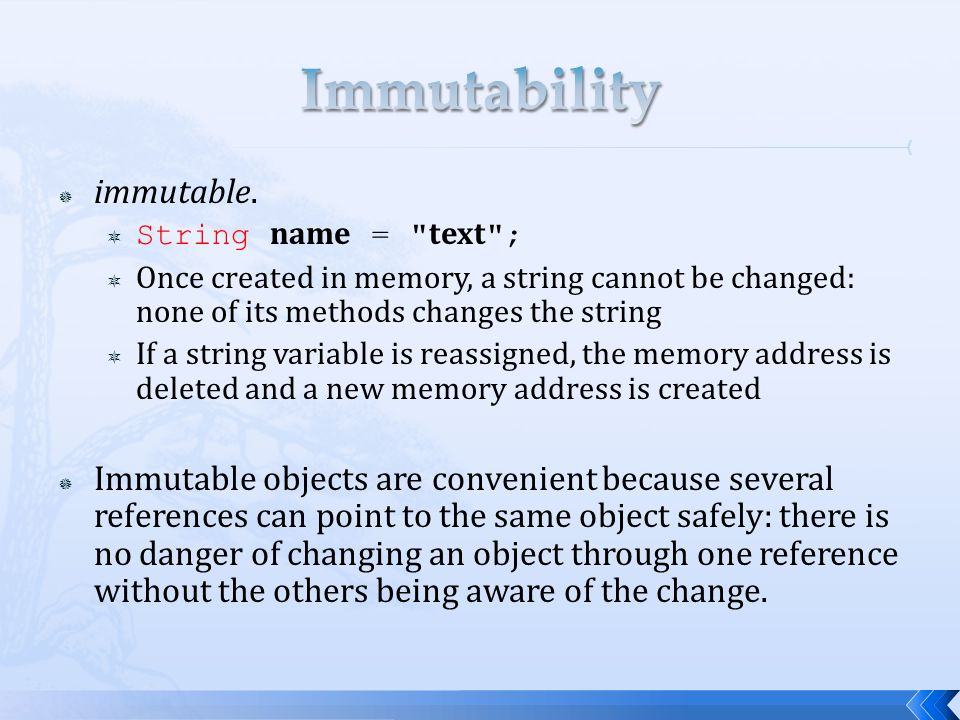Why Are Strings Immutable in Java? Comprehensive Guide for Beginners
Wiki Article
Unalterable Strings: A Secret Component in Ensuring Data Consistency and Integrity
In the world of data monitoring, the significance of unalterable strings can not be overstated. These unvarying series of personalities play a critical role in supporting the stability and accuracy of information within systems. By maintaining a state of immutability, information consistency is ensured, fostering a structure of dependability whereupon vital procedures depend. The idea of unalterable strings transcends mere formality; it is a cornerstone in the complex web of information governance. As we discover the benefits, implementation approaches, and functional applications of immutable strings, a clearer picture arises of their vital nature in guarding the electronic landscape.The Principle of Unalterable Strings
Unalterable strings, an essential principle in programming, describe strings that can not be changed as soon as they are developed. Basically, when a string value is appointed, any operation that shows up to modify the string in fact creates a brand-new string. This immutability makes certain information consistency and reliability in applications, as it stops unforeseen modifications to the initial data.
Advantages in Data Consistency

Data uniformity is crucial in numerous facets of software application advancement, including database management, multi-threaded atmospheres, and distributed systems (Why are strings immutable in Java?). Unalterable strings add dramatically to accomplishing this uniformity by protecting against information corruption because of simultaneous accessibility. In scenarios where numerous procedures or strings interact with the very same information concurrently, immutable strings work as a secure against race conditions and synchronization issues
Furthermore, the immutability of strings simplifies debugging and testing processes. With unalterable strings, developers can rely on that once a string is set, it will remain unchanged, making it simpler to map the source of mistakes and making sure that test cases produce regular results. This dependability in data handling inevitably results in a lot more secure and robust applications.
Carrying Out Unalterable Strings
Making sure the immutability of strings needs a thoughtful technique to their execution in software application development. Once a string item is created, one vital method is to design string courses in a way that protects against alterations. By making strings unalterable, developers can enhance information consistency and integrity in their applications.To carry out unalterable strings effectively, programmers should favor producing new string items as opposed to modifying existing ones. This method makes sure that as soon as a string is assigned a value, it can not be transformed. In addition, any operation that shows up to change the string ought to develop a brand-new string with the wanted modifications as opposed to modifying the initial.
Furthermore, making use of unalterable strings can streamline concurrency management in multi-threaded settings. Given that immutable strings can not be altered after creation, they can be safely shared among multiple strings without the danger of data corruption.
Function in Reliability Assurance
In software development, the usage of immutable strings plays a vital duty in making sure the integrity of data operations. browse around these guys Immutable strings, once developed, can not be modified, making certain that the data they represent remains regular throughout the application's execution. This immutability property provides a degree of guarantee that the data being refined will not be inadvertently altered, causing unforeseen outcomes or mistakes in the system.By incorporating unalterable strings into software application design, developers can enhance the reliability of their applications by reducing the dangers related to mutable information - Why are strings immutable in Java?. Unalterable strings assist in preventing information corruption or unplanned alterations, which can be particularly crucial when taking care of sensitive information or when data honesty is extremely important
Furthermore, using unalterable strings streamlines concurrent processing, as numerous strings can safely accessibility and share string information without the danger of one thread modifying the content while one more is reading it. This facet adds dramatically to the total dependability of the software application system, making sure consistent and foreseeable actions in data dealing with procedures.
Applications and System Integration
The seamless combination of unalterable strings right into numerous applications and systems is crucial for making sure durable information consistency and integrity throughout varied technical environments - Why are strings immutable in Java?. Immutable strings play a crucial duty in improving the stability of information exchanges and interactions within complex software environments. By including immutable strings into applications, developers can minimize the risks linked with data tampering, unapproved adjustments, and unintended alterations, thus fortifying the overall safety posture of the systemImmutable strings can enhance interoperability in between inconsonant systems by giving a standardized layout for data representation, enabling much more efficient data handling and exchange protocols throughout interconnected systems. By taking on unalterable strings in applications and system integration processes, companies can strengthen their information infrastructure and maintain the integrity and consistency of their information assets.
Conclusion
In conclusion, unalterable strings play an essential duty in maintaining information consistency and dependability in different applications and system assimilations. By making sure that strings can not be changed once developed, the integrity of information is preserved, minimizing the danger of incongruities and you can try this out mistakes. Carrying out immutable strings can significantly boost the integrity of systems, ultimately resulting in more reputable and precise information handling.
Report this wiki page